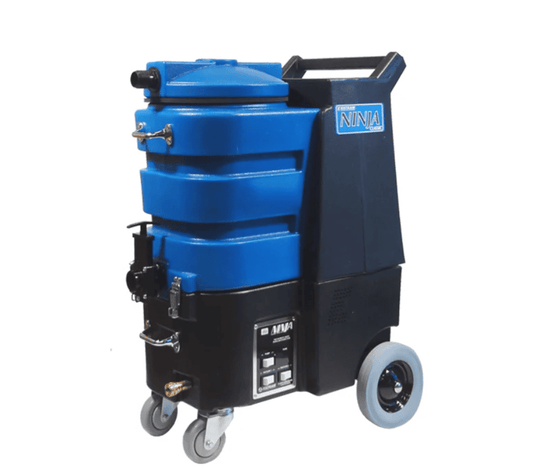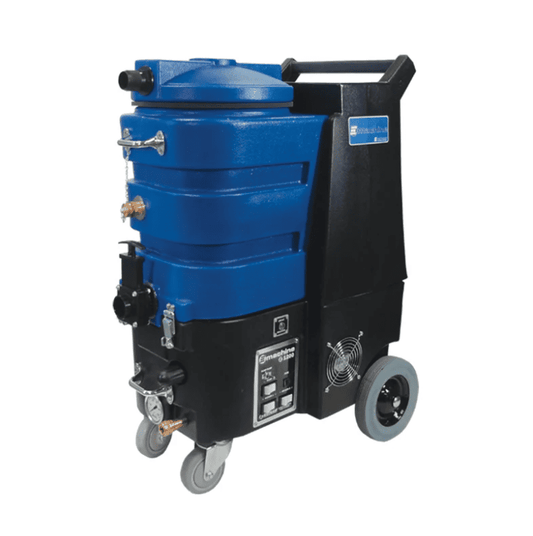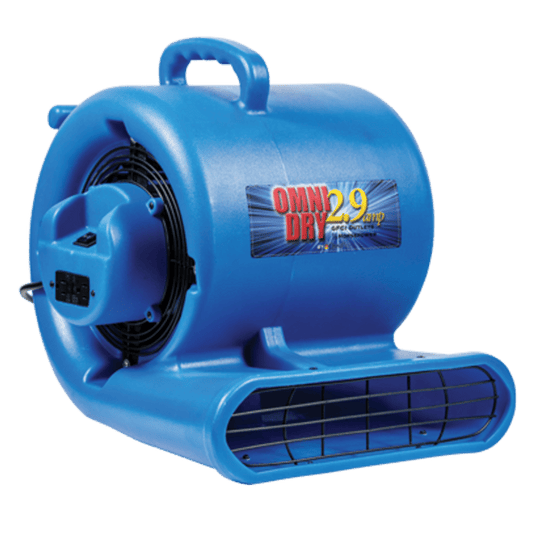Understanding What a Carpet Extractor Is
Let’s kick things off by explaining what a carpet extractor actually does and why it’s different from an ordinary vacuum.
A carpet extractor is a specialized cleaning tool made to deep-clean carpets by removing embedded dirt, stains, and allergens from deep within the fibers. Unlike standard vacuums that only pick up surface debris, extractors combine water, cleaning solution, and powerful suction to deliver a much deeper clean.

How a Carpet Extractor Operates
1. Applying Water and Cleaning Solution
The machine first sprays a mix of water and detergent directly into the carpet. This loosens dirt, stains, and grime that are buried within the fibers.
2. Agitation Process
Depending on your model, your extractor may use a wand, rotating brush, or built-in agitation system to work the cleaning solution into the carpet. These brushes help lift debris and break down stains.
If your machine doesn’t have an agitator, you can use a carpet rake or broom to help spread and scrub in the solution manually.
3. Extraction Stage
Once the cleaning solution has soaked in, the extractor’s suction pulls out the dirty water, loosened debris, and residues from the carpet.
4. Recovery and Drying
The dirty water is collected in a separate recovery tank for easy disposal. More powerful extractors have stronger airflow and suction, helping the carpet dry faster.
Now that you understand how extractors work, let’s look at how to choose the best one for your cleaning business.

Step 1: Define the Cleaning Services You’ll Offer
Before choosing your machine, consider what kind of services you’ll be providing and the types of jobs you’ll take on. The right machine for auto detailing won’t necessarily be ideal for commercial carpet cleaning.
Common Service Types
Residential Carpet Cleaning
For small to medium home jobs, start with a reliable entry-level extractor that fits your budget and is easy to move around.
Commercial Carpet Cleaning
Businesses and large spaces require more power and larger tanks to handle heavy-duty cleaning and faster dry times.
Automotive Detailing
Car interiors can be cleaned efficiently with smaller extractors or spotters since most work is done using handheld tools.
Upholstery Cleaning
Cleaning fabric furniture requires a hand tool, but a versatile extractor lets you clean both upholstery and carpets.
Spot and Stain Removal
For dedicated stain removal services, a smaller spotter like the Esteam E300 Pro Spotter works well. For tougher stains, opt for a larger extractor with a hand attachment.
Step 2: Match the Machine to Your Facility Type
The next step is to think about where you’ll be cleaning. Certain facilities have specific challenges that affect your equipment choice.
Common Facility Types
- Office Buildings
- Hotels
- Restaurants
- Residential Buildings
- Family Vehicles
Typical Carpet Cleaning Challenges
- High Foot Traffic: Requires stronger suction and frequent deep cleans.
- Spills & Stains: Coffee, food, and ink stains need targeted stain removal solutions.
- Heavy Grease or Oil: Common in restaurants, often needs heated water or special chemicals.
- Varied Carpet Materials: Homes and offices may use different fibers needing adjustable PSI.
- Quick Dry Times: Especially important for public or food-service environments.
- Accessibility: Tight spaces or multi-floor buildings may require portable, lightweight machines.
Step 3: Choose Between Box and Self-Contained Extractors
Self-Contained Carpet Extractors
These machines don’t require external hoses or wands and are perfect for large, open areas. They dispense water and detergent, scrub with built-in brushes, and vacuum the dirty water, ideal for hallways and commercial spaces.
Box Extractors
These models use hoses and wands to spray, scrub, and extract. They’re extremely flexible for tight spaces, stairs, and furniture cleaning.
Step 4: Understanding Motor Types – Single vs Dual, 2-Stage vs 3-Stage
The Basics
You’ll see terms like single motor, dual motor, and 2-stage or 3-stage.
- Single/Dual: Refers to the number of motors.
- 2-Stage/3-Stage: Refers to how many fans are inside each motor.
For example, a Dual 2-Stage extractor has two motors, each with two fans. More motors and stages mean stronger suction and faster drying — but also higher cost and weight.
Pros and Cons
Single Motor
- ✅ Lighter and cheaper
- ✅ Easier maintenance
- ❌ Less suction power
- ❌ Slower cleaning
Dual Motor
- ✅ Greater suction power
- ✅ Handles large or dirty carpets better
- ❌ Heavier and pricier
- ❌ Consumes more energy
If you’re unsure, talk to a sales expert for recommendations (833) 356-6323).

Step 5: Decide on Heat and Tank Capacity
Heated Extractors
Some units heat the cleaning water to break down grease and stains more effectively.
Types of Heaters:
- Inline Heaters: Warm the water as it flows, offering continuous hot cleaning.
- Tank Heaters: Heat all the water in advance, maintaining a steady temperature.
Pros of Heated Models
- Deeper, more efficient cleaning
- Faster drying times
Cons
- Higher price and energy use
- More components that could need maintenance
Tank Size
Tank capacities range from 3 to 12 gallons (some up to 20).
- Smaller tanks: Easier to transport but need frequent refills.
- Larger tanks: Fewer stops but heavier to move.
For most businesses, 5–12 gallons is a practical range.
Step 6: Understanding Pump Pressure (PSI)
PSI measures the spray pressure of the cleaning solution. The right PSI depends on your job type:
|
PSI Range |
Cleaning Type |
Recommended Use |
|
55–150 PSI |
Light Duty |
Upholstery, area rugs |
|
200–300 PSI |
Medium Duty |
Residential carpets |
|
400–500 PSI |
Heavy Duty |
Commercial, industrial |
|
600–800 PSI |
Very Heavy Duty |
Large-scale or deep cleaning |
|
1000+ PSI |
Specialty |
Tile, grout, hard surfaces |
Some extractors allow adjustable PSI, giving you flexibility for multiple cleaning types.
Step 7: Think About Portability and Storage
If you’re running your business out of a small vehicle, portability matters.
Ask yourself:
- Will it fit in my car or van?
- Can I easily move it through hallways and stairs?
- Do I have space to store it?
Compact 5–6 gallon machines often fit in a trunk, while larger models may require removing a seat or upgrading to a van later.
Step 8: Essential Tools and Attachments
Before buying, consider which accessories are essential versus optional.
Must-Haves
- Vacuum Hose
- Solution Hose (same length as vacuum hose)
- Carpet Wand
Nice-to-Haves
- Upholstery Hand Tool
- Built-in Heater
- Extra Hose Lengths
Start with the basics — you can always add more tools as your business grows.

Step 10: Set Your Budget Wisely
While some say budget should come first, it’s smarter to determine your needs before setting your price range.
Commercial extractors typically cost between $1,000 and $10,000, but a good unit can pay for itself many times over. Invest in durability and efficiency, not just the cheapest option.

Step 11: Pick Your Extractor and Start Cleaning
To recap:
- Define your services
- Pick the extractor type
- Choose your motor setup
- Decide on heat and tank size
- Match PSI to your jobs
- Consider portability
- Get the right accessories
- Compare brands and pricing
- Choose confidently and start cleaning!
Recommended Esteam Ninja Carpet Extractors
1. Esteam Ninja 200 Classic Carpet Extractor
Ideal for residential cleaning, this 200 PSI portable extractor is CSA-approved, durable, and affordable.
2. Esteam E600 Carpet Cleaning Machine (Perfect starter machine)
Compact yet powerful, perfect for auto detailing or small to medium cleaning jobs.
3. Esteam Spotter E300
Lightweight and affordable, great for upholstery and vehicles, not large carpeted areas.
4. Esteam E1200 Hard Surface & Carpet Cleaner
A 1200 PSI powerhouse suitable for both carpets and tile/grout cleaning.

As always call or use our live chat to speak to our expert staff: 1 (833) 356-6323





